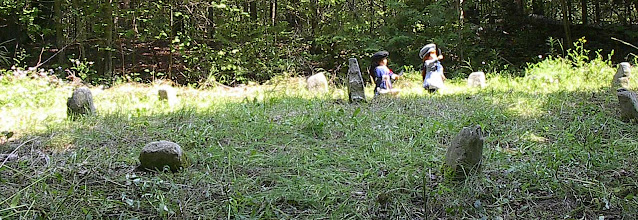
“You know how Samantha and Julia stumbled through a thin place between the worlds and came out in the fairy realm?” remarked Kelly.
“Yes,” replied Jane, “and they escaped from Faerie by the skin of their teeth.”
“It occurred to me,” went on Kelly, “that the circle of standing stones that Bailey and I found may be another thin place between the worlds, and I wouldn’t be surprised if it was connected by a ley line with the other-worldly cave that led to Faerie.”
“What are you getting at?” asked Jane, uneasily.
“The fairies know we’re here and that we know about them. If we don’t propitiate them somehow, they could work serious mischief on us.”
“Like making our cow go dry?’
“Exactly! So it’s a good thing we don’t have a cow.”
“Tonight,” said Jane, “is Midsummer’s Eve. Back home, on this night, householders would leave bowls of bread and milk to feed the fairies in an attempt to stay on their good side.”
“So that’s what we should do.” Kelly declared, “and leave it in the stone circle. This is a night when some thin places open up completely.”
“But we’d better have some iron about us,” said Jane, “as protection against fairy magic.”
“I’d thought of that, and some salt, too!”
“Salt?!” exclaimed Jane, “That’s protection against witches, not fairies! Lands sakes! What do they teach children these days?”

“Back home,” said Jane, “above the village of Poppets Revel was a hill called Poppets Halistane, and at its apparent crest there was a circle of standing stones very like this one. No one ever went there, for ‘twas said it was a fairy haunt. Those who did go there without iron on them were either never seen again or went mad.” She tightened her grip on her knife and held it high.



“We should summon the fairies,” suggested Kelly.
Jane drew in her breath. “Be careful how you call them. They are not to be trusted, especially this evening.”
Kelly spoke loudly and clearly, “People of Peace! Come hither this night and accept this our gift of bread and milk!” She turned to Jane. “How was that?”
“Jes’ fine, but let’s skedaddle home while we still can!”

“Those mortal maidens have called us,” said one, in her high, squeaky voice.
“And left us a bowl of bread and milk,” said the other, equally shrill in tone, “Not very original, I must say.”
“No one has offered us anything for hundreds of years.”
“It’s not like the good old days when Tom of Bedlam fed us.”
They laughed a high, silvery, tinkling laugh, tinged with menace.
“This bowl was sincerely offered, and we are duty-bound to accept it. Let’s sit and eat.”

“Now we are also duty-bound not to molest them in their homes for at least the coming year.”
“So we can’t make their cow go dry?”
“They don’t have a cow.”
“Well, that relieves us of that responsibility!”


“Happy Midsummer, Jane,” said Kelly, “I hope this has helped us to befriend the Good Folk.”
“Watch what you say!” Jane was stern. “They are never your friends! The best we can hope for is that they are not our enemies.”

No comments:
Post a Comment